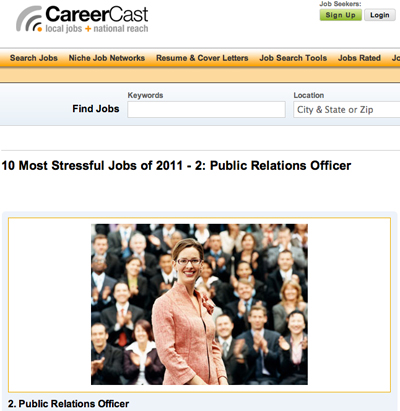 PR jobs rank near the top in producing stress, says CareerCast.com. Its list of the “Ten Worst Jobs of 2014” puts “newspaper reporter” in second position.
PR jobs rank near the top in producing stress, says CareerCast.com. Its list of the “Ten Worst Jobs of 2014” puts “newspaper reporter” in second position.
The flood of news of downsizings (New York Times, New Republic, etc.), reduced publication frequency, and outright closures helped push newspaper reporter to its dubious position, says CareerCast, whose rankings are picked up by HuffPost and numerous other media.
CareerCast in 2011 rated “PR officer” as the second most stressful job, moving it up six places from No. 8.
“PR executive” was No. 5 on its 2013 list of the ten most stressful jobs.
Such executives are required to do “damage control” which means they have to “think and act quickly under stress,” says CareerCast. “They live in the public eye.” They are also “on call” 24/7 because “news never stops” and they must deal with “potentially hostile” reporters. The occupation is very attractive to college students which makes “getting and keeping a good job that much more difficult,” it adds.
PRSA VP-PR Yann Died at 48
There’s no doubt in our mind that the death of PRSA VP-PR Arthur Yann on Thursday, June 13, 2013 at age 48 was at least partly caused by the stress of his job. CEO Bill Murray said Yann had “one of the toughest jobs in PR—VP-PR for an organization representing more than 20,000 PR pros.”
Yann’s death was stressful for the Society in several ways. It came on the day the Society was to publicize more than 250 Silver and Bronze Anvil winners. Yann had attended the event the night before and was stricken on the 8:35 p.m. train to Fairfield, Conn. His commute from Fairfield to Society offices downtown on Maiden lane and to Fairfield was a two-hour trip each way.
Instead of announcing the death on Friday morning, Murray held up the news until Monday, saying, “Our community joins me in mourning the sudden and unexpected death of our friend, co-worker , colleague and PRSA member Arthur Andrew Yann.”
No further details were given for such a major development that cried out for an explanation. We tracked down what happened and ran a story Tuesday, June 18. 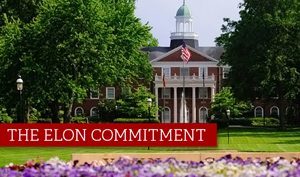 PRSSA President Harder Is “Stressed”
PRSSA President Harder Is “Stressed”
The subject of stress has come up because the O’Dwyer Co., which was barred from exhibiting its six news and informational products at the PRSA conference in D.C. Oct. 13-16, contacted PR Student Society president Heather Harder of Elon University, N.C., in a bid to have her and other PRSSA leaders give us the hearing that national Society would not.
We’re hopeful that in a college setting, where knowledge is pursued and not avoided, Heather and other PRSSA leaders will provide a way to rectify the boycott that deprives students of knowing about a major source of PR news, information, instructional materials, and job listings. We’re sure that many if not most of the 300 chapters (11,000 members) would find all or most of the O’Dwyer products useful.
|
|
Harder rejected our request. Her e-mail of Dec. 6 said Society h.q. did not “approve” of our request for an “interview/comment.” She advised us to contact VP-PR Stephanie Cegielski.”
Cegielski e-mailed that we were causing Harder “stress” and to “cease and desist” from any attempts to contact her or anyone at Elon University.
Elon Faculty Must Be Involved
Harder’s rejection does not square with the philosophy of the school.
The “Elon Commitment” is to “Engaged Minds” and “Inspired Leaders.” Other values in the statement are for “freedom of thought,” “liberty of conscience,” and “scholarly accomplishment.” It also does not track with the PR Society’s own vow to promote “the free flow of information.” The Student Society recently named a "VP of Advocacy" to deal with "issues of importance" to the industry and PR students.
She should not have to face the Society alone in this matter, which involves being shorn of her right of free speech, her right of free inquiry, which is what college is all about. There’s no doubt the Society can offer her plenty of career opportunities and options but is that worth trading for her right of free speech?
|
|
|
|
She needs advice and support from Elon administration and faculty including president Leo Lambert, Ph.D., Paul Parsons, Ph.D., dean of the 1,150-student School of Communications, and Don Grady, Ph.D., associate dean. The image of the University is at stake in this matter. Faculty who should get involved include Max Negin, former editor, writer and producer for NBC, ABC, Fox, ESPN HBO and Comcast SportsNet; Jonathan Jones, broadcast journalist for more than 20 years; Diane Finch, who worked for AP and BLoomberg News, and Frances Ward-Johnson, acting dept. chair who worked for the AP and Greensboro News & Record.
Special support should come from Lucinda Austin, Ph.D., faculty adviser who assisted Harder in the project she did on how Coca-Cola confronts “health concerns related to obesity” which won a $5,000 prize from the Arthur W. Page Society on April 4.
The Harder paper notes that attempts to position Coke as an enemy of obesity are called “disingenuous” by critics. She appears to accept Coke’s position that the artificial sweetener aspartame is safe. A fuller report on Coke would have referenced “The Campaign to Stop Killer Coke,” a worldwide movement that accuses the company not only of selling a product that raises numerous health concerns and is critical of aspartame, but which is identified with abuses of its employees and distributors in many countries. New York University banned all Coke products from 2006-2010. Students are seeking a return of the ban.
A fuller report on Coke would have referenced “The Campaign to Stop Killer Coke,” a worldwide movement that accuses the company not only of selling a product that raises numerous health concerns and is critical of aspartame, but which is identified with abuses of its employees and distributors in many countries. New York University banned all Coke products from 2006-2010. Students are seeking a return of the ban.
The 1.6 million-member American Federation of Teachers on Nov. 18 called on members and affiliates to urge removal of Coke products from schools, colleges, hospitals and other places in which they work. The AFT accuses Coke of unfair labor practices in numerous countries.
Austin, who focuses on health and crisis communication, should be interested in the 68-page October 2014 O’Dwyer’s magazine that had 15 articles on healthcare PR, including how to cope with social and other media, and profiled more than 40 healthcare practices. Sixty-six healthcare PR practices are ranked by size based on income tax returns and W-3 totals.
The 6,483-student body at Elon should know about Harder’s relationship with the student and national PR Societies. What do the students make of this clash of commercial and educational interests? Elon has 5,782 undergrads and 701 graduate and professional students. Tuition is $31,247 and room/board, $10,667.
The subject should be taken up by the weekly student publication The Pendulum. Jonathan Black is editor and Katy Canada is managing editor. Seventy-five students are involved in reporting and other duties for the paper and its website. Documentation of PR Society policies and practices is in this link.

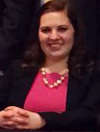
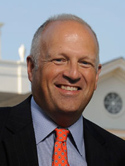
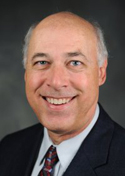
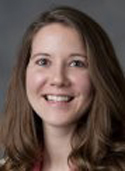

 PRSA-NY today announced its five honorary co-chairs for its Big Apple Awards ceremony gala slated for TAO Downtown on Nov. 15.
PRSA-NY today announced its five honorary co-chairs for its Big Apple Awards ceremony gala slated for TAO Downtown on Nov. 15. PRSA-NY president Carmella Glover today issued a "heartfelt apology" on behalf of the chapter for her Oct. 14 message that "caused disappointment and hurt to some of our valued members."
PRSA-NY president Carmella Glover today issued a "heartfelt apology" on behalf of the chapter for her Oct. 14 message that "caused disappointment and hurt to some of our valued members."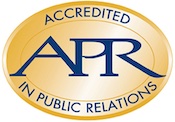 The leadership of Public Relations Society of America is backing a move to change the current “must-have” APR accreditation to “strongly preferred” as a requirement for a seat on its board of directors.
The leadership of Public Relations Society of America is backing a move to change the current “must-have” APR accreditation to “strongly preferred” as a requirement for a seat on its board of directors.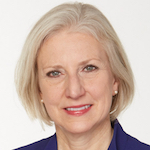 Public Relations Society of American today named Linda Thomas Brooks CEO, succeeding CFO Phil Bonaventura, interim chief since July 2019.
Public Relations Society of American today named Linda Thomas Brooks CEO, succeeding CFO Phil Bonaventura, interim chief since July 2019.


 Have a comment? Send it to
Have a comment? Send it to 
No comments have been submitted for this story yet.